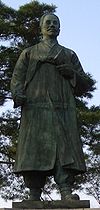- Doksa Sillon
-
Doksa Sillon Hangul 독사신론 Hanja 讀史新論 Revised Romanization Doksa sillon McCune–Reischauer Toksa sillon Doksa sillon or A New Reading of History (1908) is a book that discusses the history of Korea from the time of the mythical Dangun to the fall of the kingdom of Baekje in 926 CE. Its author––historian, essayist, and independence activist Shin Chaeho (1880-1936)––first published it as a series of articles in the Daehan Maeil Sinbo (the Korea Daily News), of which he was the editor-in-chief.[1]
As the first work to equate the history of Korea with the history of the Korean nation (minjok),[2] Doksa sillon rejected the conventional Confucian histories that focused on the rise and fall of dynasties[3] as well as the Japanese Pan-Asianist claims that Koreans, Japanese, and Chinese were all part of the "East Asian" or "yellow" race.[4] Influenced by Social Darwinism,[5] Shin portrayed the Korean minjok as a warlike race (which he called "Buyeo" after the name of an ancient kingdom)[6] that had constantly fought to preserve Korean identity but had later been weakened by Confucianized elites like the yangban of the Joseon Dynasty.[7] Doksa sillon was one of the earliest expressions of Korean ethnic nationalism[1] and it laid the foundation for Korean nationalist historiography, which used the study of ancient Korea to resist Japanese colonial scholarship while Korea was under Japanese rule.[8]
Notes
- ^ a b Andre Schmid, Korea Between Empires, 1895-1910 (2002), p. 181.
- ^ Sheila Miyoshi Jager, Narratives of Nation-Building in Korea (2003), p. 16.
- ^ Sheila Miyoshi Jager, Narratives of Nation Building in Korea (2003), p. 152, note 8; Henry H. Em, "Democracy and Korean Unification from a Post-Nationalist Perspective" (1998), p. 57; Henry H. Em, "Minjok as a Modern and Democratic Construct: Sin Ch'aeho's Historiography" (1999), p. 341.
- ^ Henry H. Em, "Minjok as a Modern and Democratic Construct" (1999), pp. 345ff; Kim Bongjin, "Sin Ch'ae-ho: 'A Critique of Easternism,' 1909" (2011), p. 191.
- ^ Andre Schmid, "Rediscovering Manchuria" (1997), p. 34. See also Schmid's Korea Between Empires, 1895-1910 (2002), pp. 183-84, 230.
- ^ Andre Schmid, "Rediscovering Manchuria" (1997), p. 32.
- ^ Sheila Miyoshi Jager, Narratives of Nation Building in Korea (2003), pp. 15-16.
- ^ Key S. Ryang, "Sin Ch'ae-ho (1880-1936) and Modern Korean Historiography" (1987); Stella Yingzi Xu, "That glorious ancient history of our nation" (2007), p. 171.
Bibliography
- Em, Henry H. (1998). "Democracy and Korean Unification from a Post-Nationalist Perspective." Asea yongu 41.2: 43-74.
- Em, Henry H. (1999). "Minjok as a Modern and Democratic Construct: Sin Ch'aeho's Historiography." In Colonial Modernity in Korea, edited by Gi-wook Shin and Michael Robinson, pp. 336-61. Cambridge: Harvard University Asia Center, distributed by Harvard University Press.
- Jager, Sheila Miyoshi. (2003). Narratives of Nation-Building in Korea: A Genealogy of Patriotism. New York: M.E. Sharpe.
- Kim Bongjin. (2011). "Sin Ch'ae-ho: 'A Critique of Easternism,' 1909." In Sven Saaler and Christopher W.A. Szpilman, eds., Pan-Asianism: A Documentary History, Volume 1: 1850-1920, pp. 191-94. Plymouth, England: Rowman & Littlefield.
- Ryang, Key S. (1987). "Sin Ch'ae-ho (1880-1936) and Modern Korean Historiography." The Journal of Modern Korean Studies 3: 1-10.
- Schmid, Andre. (1997). "Rediscovering Manchuria: Sin Ch'aeho and the Politics of Territorial History in Korea." Journal of Asian Studies 56.1: 26-46.
- Schmid, Andre. (2002). Korea Between Empires, 1895-1919. New York: Columbia University Press.
- Xu, Stella Yingzi. (2007). "That glorious ancient history of our nation: The contested re-readings of 'Korea' in early Chinese historical records and their legacy in the formation of Korean-ness." Ph.D. dissertation, Department of East Asian Languages and Culture, UCLA.
Categories:- 1908 books
- Historiography
- History of Korea
- Korean history books
Wikimedia Foundation. 2010.

